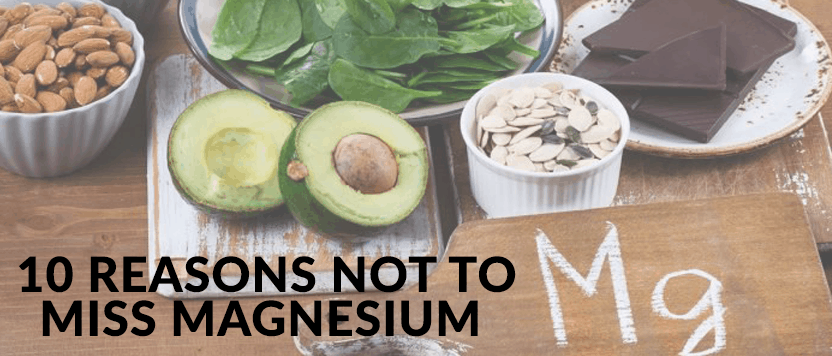With all of the buzz about calcium for bones, iron for blood, or zinc for fighting colds, it can be easy to miss out on the metabolic magic of magnesium. But with at least half of Americans suspected to be magnesium deficient, you may be missing the mark! Read on to learn more about this magnificent mineral- and how meeting your needs could make or break your metabolism!
Are you Missing Out?
Magnesium is the 4th most common mineral in your body and is used in over 600 important metabolic reactions. Additionally, as we revealed in our first book Naked Calories, magnesium expert Carolyn Dean, M.D., N.D., states that “Up to 80 percent of the U.S. population is suffering from a magnesium deficiency.” Adequate magnesium levels are important for preventing chronic diseases that are the top killers of Americans. Magnesium deficiency and insufficiency are common and associated with several conditions, including:
- Osteoporosis
- Heart and Vessel Disease
- High Blood Pressure
- Arrhythmia
- Alzheimer’s Disease
- Type 2 Diabetes
- Insulin Resistance
- Calcium Deficiency
- Dental Cavities
- Attention Deficit Hyperactivity Disorder
- Recurrent Infections / Depressed Immunity
- Thiamin Deficiency
- Premenstrual Syndrome
- Hearing Loss
- Muscle Cramping and Weakness
- Impotence / Lack of Nitric Oxide
- Aggression
- Depression
- Iron Overload
- Potassium Deficiency
People at the greatest risk of magnesium deficiency include:
- Those who do not eat enough magnesium, whether simply from not eating enough or choosing insufficient plant and sea-foods.
- Those who do not absorb the magnesium that they eat. Without enough stomach acid (due to stress, age, or stomach damage) you will have trouble absorbing magnesium. Suffer from Celiac or Crohn’s disease? You will surely absorb less. Magnesium is easiest to absorb from plant foods that have been sprouted, soaked, or cooked. Interestingly, magnesium deficiency (or alcohol dependence) compromises thiamin activity, which hinders stomach acid production: so magnesium deficiency can worsen magnesium deficiency.
- Those who use or lose a lot of magnesium. Loss may be due to high sodium intake, excessive stress, profuse sweating, intense exercise, high caffeine intake, excessive menstruation, and even by certain medications (like antacids).
10 Reasons Not to Miss Magnesium
- Energy! Magnesium helps convert food into energy not only as a helper for certain B vitamins, but also by activating ATP, your main energy molecule. Magnesium helps optimize your fuel use: deficiency is correlated with an increased risk of diabetes and low intakes are associated with insulin resistance; magnesium has also been shown to improve glucose control in type 2 diabetics with magnesium deficiency.
- Muscles! Magnesium mellows muscles, working with calcium to move your body around. Tired, crampy muscles may lack magnesium. While several studies show magnesium supplementation can help athletes improve performance and support those with chronic disease, several also show no benefit. Athletes and sick people may be magnesium deficient to begin with. Relaxing muscles of (as well as drawing water into) the colon helps soften stools.
- Protein! Magnesium helps you make protein, so it helps build your muscle, too! Proteins are like words; amino acids are the letters that build them. Magnesium helps translate the letters so you can build the words. Inadequate magnesium can slow down all growth and repair!
- Messaging! By helping to move calcium across membranes, magnesium is vital for sending nerve impulses, like electricity through a wire. Magnesium levels can also affect your neurotransmitters- which ones are made and how they are released. In short, magnesium affects all communication in your body to some extent.
- Flow! Magnesium is critical for cardiovascular health. By helping move calcium and potassium across cell membranes, it is needed to maintain a normal heart rhythm. In those with high blood pressure, whether independent of or due to pregnancy, magnesium can bring it down. Magnesium has been shown, in overweight people, tired older adults, and those with pre-diabetes, to reduce the inflammation that underlies most cardiovascular disease. If you have a heart, you can’t afford to miss magnesium!
- Information! Magnesium helps you make and repair your genetic material, DNA and RNA. Every time you make a new cell, magnesium assists.
- Bone! Magnesium is part of your mineral skeleton, with calcium. It boosts the number of your bone-making cells and reduces bone loss. Beyond being part of bone, magnesium helps you use vitamin D, which in turn helps you use calcium!
- Pain (and Migraine)! Topical magnesium in oils, Epsom salts, and supplementation can help soothe muscle pain, as tired, sore, crampy muscles may be a sign of low magnesium. By helping get blood sugar into your muscles, magnesium helps muscles dispose of built-up lactic acid that has built up during exercise and caused pain. For these reasons, magnesium has been recommended to support fibromyalgia.
Suffer from migraine headaches? Current research suggests that adequate magnesium levels can help prevent migraine likely by supporting normal blood pressure, adjusting neurotransmitters, and reducing blood clumping (slowing platelet activity). Magnesium is required not only to reduce glutamate, a neurotransmitter that can drive headaches, but also to use GABA, a neurotransmitter that can calm anxiety and soothe your headspace.
- Sleep! Not only does magnesium mellow muscles, improve brain blood flow, reduce heart rate, and lower stress hormone levels, but it also supports neurotransmitters you need for a good night’s rest. It helps you produce GABA and serotonin, which help you get to sleep and stay asleep (respectively). Magnesium supports slumber, gently extending sleep time and reducing early morning awakening, unlike melatonin or medications that can leave a groggy residue the next day. Because magnesium supports both rest and energy levels, it may be recommended as part of a nutritional intervention for chronic fatigue.
- Mood! Lower magnesium levels regularly are shown to correlate with depression, even in younger adults, and magnesium has been used as an antidepressant (and worked just as well) with benefits in many. Researchers have even noted improvements in mood swings related to PMS (and bloating) with magnesium supplementation!
Magnificent Magnesium
FOOD: Choose whole foods high in magnesium (and calcium), especially vegetables, plant proteins, and seafood and avoid foods that steel magnesium!
- Get your green on: While all green leaves contain magnesium-rich chlorophyll, of special note are spinach, lambsquarters, swiss chard, purslane, nettles, kale, beet greens, and nopales. Avocado is also a great source.
- Eat more baby plants. Seeds, nuts, beans, peas, and sprouts are full of magnesium because it is needed for cell division and growth. The richest sources are cocoa, black beans, hemp seeds, pumpkin seeds, flax seeds, Brazil nuts, almonds, and wheat germ.
- Munch on Magne-sea-yum. Fish, seaweeds, and other seafoods are great magnesium sources. Emphasize salmon, mackerel, pollock, anchovies, and all seaweeds. Milk is also a good source of magnesium.
- Avoid foods that hinder magnesium absorption. Raw vegetables, grains, legumes, nuts, and seeds contain phytates and/or oxalates that bind calcium, magnesium, and other minerals, preventing their absorption. Cooking, soaking, and sprouting can break some of these bonds, while chewing well helps boost stomach acid.
- Avoid sugar and wheat. Processing dietary sugar can deplete your calcium, magnesium, chromium, and copper. Glucose also competes with vitamin C for entry into your cells. Wheat contains lectins that can compromise your intestinal lining and phytates that bind minerals.
LIFESTYLE: Actively avoid magnesium loss.
- Mind your Medications. Avoid medications that reduce mineral absorption, especially proton pump inhibitors, antacids, diuretics, calcineurin inhibitors, or laxatives. Supplementation with some competing minerals such as iron or calcium will reduce magnesium absorption.
- Soothe your Stress. Under chronic stress, your stomach acid production slows, reducing absorption of all minerals and protein. Furthermore, stress depletes magnesium by increasing your losses in urine.
SUPPLEMENTATION: Support magnesium in a balanced way with calcium.
- Safely supplement- away from calcium. Because magnesium competes with calcium for absorption, we do not recommend supplementing them at the same time. Our Nutreince formulation separates calcium and magnesium into different AM and PM doses, so you get the best of both minerals. (Just try finding another multivitamin that safeguards your magnesium in this way!)
- Most multivitamins miss magnesium! In order to avoid absorption problems, most multivitamins simply include calcium and ignore magnesium, which encourages magnesium insufficiency! The recommended daily intake is 400-420 mg for men and 310-320 mg per day for women- up to 1200 mg per day is safe to supplement. The 400 mg in Nutreince is your nighttime insurance policy, as current research suggests that 300-600 mg per day is the sweet spot for long-term magnesium repletion.
- Timing is Critical. As noted above, magnesium can help ease tired and sore muscles, reduce blood pressure, and soothe your slumber. Having your daily dose of magnificent magnesium in the evening may improve your sleep quality.
- Soak it up. A relaxing Epsom salts bath is a great way to reduce stress and boost magnesium, especially before bedtime. Lay back, relax, soothe your muscles, and maybe reflect with a copy of Micronutrient Miracle!
Magnesium is a metabolic magician that you can’t afford to miss! So go ahead, take a relaxing Epsom salt bath, indulge in a delicious magnesium meal of wild-caught salmon with sautéed mixed greens, and ensure you meet your needs through supplementation. Enjoy!
WE WANT YOU!
We are looking for a few great stories from individuals like YOU! Have you been following the Micronutrient Miracle program and had great results? Have you taken nutreince, INPOWER protein, Origin Omega or SKINNYFat and experienced benefits that you would be willing to share? Have you been reading our books or blogs and reversed a health condition or improved your general health? Did you find Calton Nutrition because of our focus on osteoporosis, and have you been healing your bones by following our advice? We are looking to share your stories. Please write to us at TheCaltons@CaltonNutrition and share your story! How have we inspired you to make real changes that gave you real results? We cant wait to hear from you and you will get a bonus for simply sharing your stories with us.











